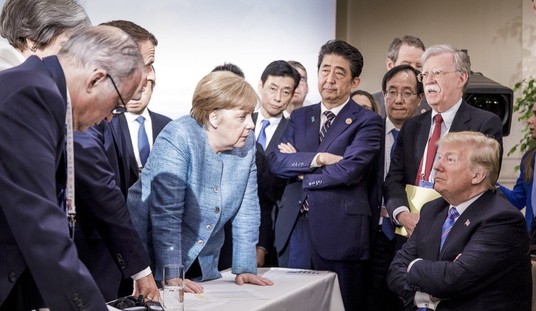Why keep pandemic-related unemployment benefits in place when America is fully reopening and millions of jobs are now available? “That makes sense,” Joe Biden insisted today after a second straight disappointing jobs report. It makes no sense at all, especially with Biden’s explanation about vaccinations:
President Biden on the temporary boost in unemployment benefits for the pandemic: "It's going to expire in 90 days — that makes sense, that it expires in 90 days." https://t.co/CXa7vqDIu9 pic.twitter.com/pko1fATZQc
— CBS News (@CBSNews) June 4, 2021
BIDEN: And temporary boost in unemployment benefits that ended — that we enacted, I should say — help people who lost their jobs through no fault of their own, and who still may be in the process of getting vaccinated. But it’s going to expire in 90 days — that makes sense, that it expires in 90 days.
Did people lose their jobs through no fault of their own? Yes, which is why the benefits got created — but even at that time, warnings went up about the perverse incentives being created. The benefits pay more than previous employment did for many, so even when those jobs reappeared, the financial reality incentivized workers to stay on the sidelines, exactly as Republicans warned fourteen months ago.
We now have over eight million job openings, and eleven million continuing claims for pandemic-related unemployment benefits. Our civilian workforce participation rate is stuck at the same level as last summer. Furthermore, vaccines are now plentiful enough in most places to ensure that anyone who wants them can get them on demand, a point that the White House has conceded in shipping 25 million doses outside the country. Why should we incentivize another 90 days of vaccine hesitancy? Wouldn’t it make more sense to incentivize demand by cutting off those subsidies and pushing people back to work instead?
Mediocre jobs reports aren’t the only problem here, either. The lack of employees is creating shortage situations in both goods and service sectors, forcing prices upward and fueling inflationary fires that have gotten accelerated by massive spending sprees and helicopter-money relief packages. The New York Times’ Jeff Sommer advises today that it’s time to take inflation seriously as an economic risk:
The current inflation surge has been much milder, so far, and, because of the pandemic, it may be fundamentally different. A combination of supply shortages, extra savings and pent-up demand account for many of the price increases showing up in the official government figures — and at gasoline pumps, home supply stores, supermarkets and used car lots.
But the extent of those increases has been worse than many economists expected. The Consumer Price Index in April rose 4.2 percent over the previous year, the biggest increase since 2008. The Fed’s preferred index — the Bureau of Economic Analysis’ personal consumption expenditure inflation measure — rose 3.6 percent in April from the prior year, the biggest gain in 13 years. Stripping away food and energy prices, that core price index rose 3.1 percent, the steepest increase since 1992. …
The United States money supply, known as M2, has grown 30 percent since the Federal Reserve and the government intervened in the economy in March 2020, he said. With such an increase, he said, “That’s pretty much it, you’re going to have a burst of inflation.”
There could be a year with 7 percent inflation, one with 5 percent, he said. “Who knows? I can’t time it.” He said that while the Fed will need to respond, it’s not likely to be facing a runaway wage-price spiral, requiring the harsh medicine of a recession, the cure imposed by Paul A. Volcker after he became Fed chairman in 1979. “This will subside,” he said, but the Fed will need to raise interest rates.
Sommer reminds us why Volcker had to act:
Back then, prices of real assets like houses, gold and oil soared. Average mortgage rates exceeded 17 percent, and interest rates on bank certificates of deposit approached 12 percent. It was hard to know whether a 5 percent pay raise was cause for celebration or despair.
No one wants to see a return to That 70s Show — least of all Joe Biden. The White House quietly let it be known yesterday that Biden reached out to inflation hawk Lawrence Summers, although it’s not clear that Biden learned anything from it:
Summers — a treasury secretary under President Bill Clinton, top economic adviser to President Barack Obama and former president of Harvard University — is a prominent Democratic voice on economic matters. But he has also become a nemesis of the party’s left flank, which sees him as representative of a misguided centrism that Democrats have moved beyond.
Summers has been warning that Biden’s $1.9 trillion stimulus package is too big and will overheat the economy, spurring inflation that could prove hard for the Federal Reserve to control. White House officials have routinely dismissed Summers’s concerns and in private express frustration with his attacks, which have bolstered Republican criticisms of the administration.
The Biden-Summers phone call, which has not been previously reported, occurred late last month, according to three people with knowledge of the conversation who spoke on the condition of anonymity to describe the private conversation. Summers, a contributing Washington Post columnist, declined to comment.
A White House official said Biden seeks “a wide spectrum of views” and the call was “brief and informal.” The official said it took place before the president gave a speech in Cleveland on Friday, in which he laid out his economic vision.
So far it doesn’t look like Biden’s paying much attention to Summers. As for this summer, it looks like employers will be left with labor shortages, and the rest of us will be dealing with the resulting supply-chain shortages. It’s not quite That 70s Show, at least not yet, but it could be the pilot episode of Welcome Back Carter.








Join the conversation as a VIP Member